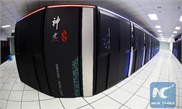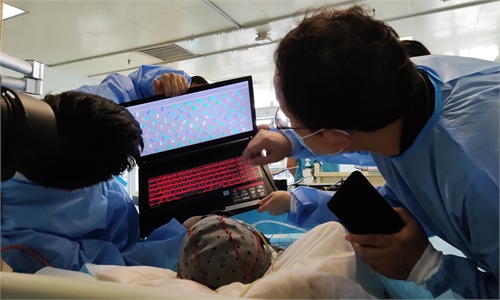To address new problems and challenges in an increasingly digital era, China is ready to launch a global initiative to safeguard global data security that welcomes the participation of all parties, Chinese State Councilor and Foreign Minister Wang Yi declared China's effort on Tuesday at a seminar on global digital governance.
The initiative comes against the backdrop of Trump administration cooking the so-called data threat from China's high-tech companies in recent months.
The move could be seen as a Chinese response to counter Washington's "Clean Network" program that clearly aims to smear and exclude Chinese technology firms, apps and services providers from some US allies.
Actually, Beijing's move seems more like a Chinese approach on how to properly handle global data security risks.
Data security, which is now under growing regulatory scrutiny, has become a focus of global attention due to the rising geopolitical risks linked to the issue. Over the past months, the Trump administration, without providing any evidence, claimed Chinese high-tech firms and their apps, such as Huawei Technologies, ByteDance's TikTok and Tencent's WeChat, could pose national security risks because of their access to Americans' personal data.
In the digital era, data security threat may be real, but politicizing security issues to use it as a weapon to crack down on other countries' high-tech companies, constitutes a reckless detachment from globally-recognized rules and practices.
Some US politicians may truly believe that suppression of Chinese tech firms by spreading the Cold War mindset to the digital sector will give the US an upper hand, but in fact, it will only undermine investor confidence in the global digital industry. This is because the utilization of data will determine how far we can go in the digital era, and if governments are obsessed with geopolitical games by abusing security issues, it will only lead to isolated islands of data, stalling the progress of the digital age.
But this doesn't necessarily mean that data security is not important, on the contrary, the fast development in global digitalization could only be achieved under the guarantee of data security.
China's latest initiative calls for an objective and rational approach to data security, which is essential for restoring confidence in global digital sector. For instance, governments should tighten data privacy laws and carry out cooperation over cyber-security issues like encryption. These are the right approaches to better protect each country's data security while avoiding political discrimination toward companies, wherever they are based.
Only with better rules can development be assured, so that countries can also avoid picking sides or being subject to arbitrary suppression from one or two specific governments.
It is also worth noting that even though China calls on the global discussion on data security, it won't set the rules. Because only rules that reflect the will of all countries in the world can be accepted and implemented in the long run.
Source link
RELATED ARTICLES:
- China launches global data security initiative, respects data sovereignty
- Maximum fine for massive data leak may reach 1 million yuan: China’s data security draft law
- China mulls new data security law to protect information sovereignty
China launches global data security initiative, respects data sovereignty
The global data security initiative China proposes is a Chinese approach and a Chinese attitude to the global response to cybersecurity.China-proposed cyber security mechanism blocks 2.8m attacks in 48 hours at intl contest
China-proposed Cyber Mimic Defense (CMD) system successfully blocked 2.8 million times of attacks from top world white-hat from 14 countries in 48 hours at a cyber security contest.Intl cooperation enhances China's role in net connectivity, safeguarding cyber sovereignty
Russia's unplugged test is not a defense measure to close itself, but a tactic to strengthen global network integration so that it will not be used by the US for military and political purposesCountries deny joining Clean Network program, claim US unilaterally put them on list: source
Facts prove that the US intention to contain China in the internet space has not been welcomed, as many of the countries that Washington claimed had joined its Clean Network program have denied being part of it, saying the US had unilaterally put their names on the list, the Global Times has learned.China extends lead in quantity of Top500 supercomputers
China extended its dominance in a list of the world's fastest supercomputers by the number of systems, according to a semi-annual ranking of the Top500 published Monday.Huawei could use local chips after US ban
China's homegrown memory chip manufactures will be able to fill the gap left by US-based memory chip producer Micron in the supplies to Huawei to a certain extent, but such replacement - coming against the backdrop of a chip ban drawing near - could mean that the Chinese tech giant will have a more difficult time ahead, in particular in its smartphone business, industry analysts said.Related posts:
The brain-like computer with over 100 million neurons. [Photo/zhejianglab.com Innovation - Chinadaily.com.cn ] China Focus: China de..
.















